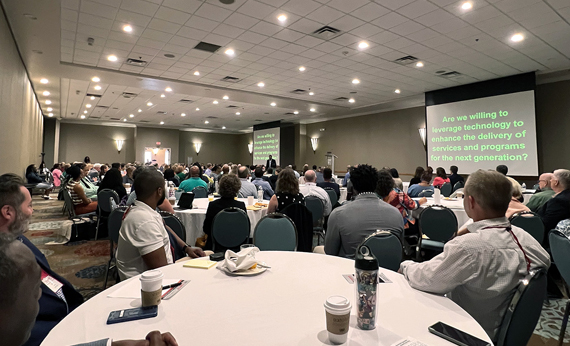Courtesy of West Virginia State University
Fall is the time of year when Cooperative Extension professionals across the Southern region gather to network, share resources, build partnerships and address emerging issues affecting our communities as a collective unit.
Members of the Southern Region Program Leadership Network (SR-PLN), Association of Extension Administrators (AEA) and the Association of Southern Region Extension Directors (ASRED) convened from Aug. 21-24 in Orlando, Florida, for the annual conference. Cooperative Extension empowers farmers, ranchers and communities of all sizes to overcome challenges, adapt to changing technology, improve nutrition and food safety, prepare for and respond to emergencies and protect our environment. Extension educators and specialists help change lives in the communities they serve.
This year’s theme for the conference was Next Generation: Evolving the Extension Enterprise. Attendees heard from keynote speaker Mansfield (Pete) Key III, a leading growth development strategist and international motivational speaker. Also, Tom Davidson of Leadership Nature presented a two-part virtual session on Treating Your Employees Like Volunteers (and Your Volunteers Like Employees) for pre- and post-conferences.
This working meeting allows land-grant institutions in the Southern region to advance their mission of fostering and strengthening Extension education programming. The structure of SR-PLN allows multi-institutional communication within and among disciplinary and functional lines.
West Virginia State University Extension (WVSU) was represented at the SR-PLN Conference by Dr. Johnnie Westbrook, associate dean of Extension; Dr. John Kessell, agriculture and natural resources program leader; Dr. Donte Pennington, family and consumer science program leader; Adam Hodges, community and economic development program leader; Sara Price, 4-H Youth Development program leader; and Jens-Kristian Kiel, director of agriculture research and Extension communications. The WVSU Extension leadership team collaborated with Extension professionals from 1890 and 1862 land-grant universities to develop a Plan of Work to address critical issues impacting agriculture, communities, families and youth in the southern region.
Adam Hodges was selected to serve on the SR-PLN Executive Committee.
Since 1989, the purpose has been to promote multistate cooperation by identifying and addressing emerging issues. Extension professionals serve in eight key areas: Agriculture and Natural Resources, Community Development, Family and Consumer Sciences, 4-H Youth Development, Communications, Information Technology, Middle Management and Program and Staff Development. These committees meet regularly throughout the year to complete multiple plans of work goals.
Accomplishments from this collaborative effort include a 2022 Southern Region Teen Leadership Conference in Crossville, Tennessee, data collection from a disaster loss assessment survey, and organizing community resiliency webinars related to climate change and communications curricula for institutional training.
A land-grant university is an institution that provides research-based programs and resources for residents in their state and has been designated by its state legislature or Congress to receive the benefits of the Morrill Acts of 1862, 1890 and 1994. There is one land-grant institution in every state and territory of the United States and the District of Columbia. Certain conditions have more than one land-grant institution due to the second Morrill Act, and some western and plains states have several because of 1994 land-grant tribal colleges.

